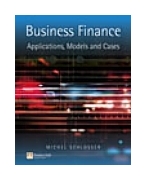Business Finance
Applications, Models and Cases
Brief Description
This streamlined text
has a sharp focus, covering only the topics of finance which are relevant to business
students and at a level which is entirely appropriate for their needs. Uniquely this book
integrates text and substantive real world cases and its practical approach will help
students learn how to use financial concepts and tools to solve a wide variety of business
problems encountered in modern organisations. This book will empower students to conduct
systematic analysis, build their own innovative action plans, understand and manage risk
and create more profit, cash and value for an organisation. The book includes cross-over
material to both general operational and strategic business issues and takes a highly
practical approach.
Features
- Excellent
mix of text and substantive integrated case studies.
- A
spreadsheet model-building approach/framework to utilising tools to solve business
problems.
- Includes
numerous real-world case studies based on real companies.
- Structured
around key operational and strategic business issues and themes.
- Takes
an applied/practical "how to solve" approach.
Contents
Introduction
Part I Shareholder value
1 Personal financial spreadsheet models for creating maximum shareholder value
Appendix to Part I Maximising value in a co-operative system
Part II Value and risk
Case A: The Jilin project
2 Is it worth doing this business?
3 Preparing for the negotiation: how to create the maximum value out of a business
opportunity
Case B: The Jilin project (II)
4 Measuring the progress made in the process of creating value
Case C: Swedish Timber
5 The need to acknowledge risk
Appendices to Part II
II.1: Compounding and discounting: some additional tools
II.2: Two additional cases focusing on value and risk
Case D: Dhahran Roads
Case E: Dhahran Roads (II)
Case F: Dhahran Roads (III)
Case G: The Gatefield project
Part III Modelling business processes and simulating their dynamics
Case H: Delta Metal
6 Cash-income parity: analyzing deviations from parity
7 Building and using a per-cent-of-sales, vertical income, free cash flow and value model
8 Building and usnig a comprehensive income, cash flow and balance sheets model
9 Price, product mix and volume changes
Case I: Delta Metal (II)
10 Building and using trajectories-of-payments-and receipts modelt
11 Growth, cash and value
12 Sequencing payments as a source of value
13 What should Delta Metal do?
Appendices to Part III: Mastering the trajectories of payments and receipts
Case J: Relais Electriques
III.1: Aligning all the cash flows on the trajectory of orders received
III.2: The 'chain of profit centres': a dangerous concept!
Case K: SW Life
III.3: Modelling the impact of growth on the trajectory of cash
Case L: PT PharMa
III.4: Building a model for an international business
Part IV Managing the trajectories of commitment in decline and growth situations
Case M: Tyler Welding
Case N: Motion-Control
14 From 'strategic what if' to 'real options' thinking
Part V Decisions to commit to new products and new markets
15 The challenge of evaluating new products and new markets
Case O: BA International
16 Launching P12: which model would help us best?
Case P: BA International
17 Designing a model of a new product decision
18 Building an improved model
19 Making the model work for us
20 Deciding about the new product
Case Q: Eagle
21 The value of flexibility
Case R: Eagle (II)
Appendices to Part V: Using a new technology to capture growth while keeping flexibility
Case S: The CLS project
V.1: Risk analysis of a major capital expenditure
Case T: The CLS project (II)
Part VI Deciding to commit to external growth opportunitites
22 A framework for evaluating companies
Case U: I, in the United Kingdom
23 A step-by-step analysis of the dynamics of an opportunity for co-operation
24 Designing a co-operative strategy and preparing for its implementatin
Case V: F Trucks
Case W: The negotiation between I and F
25 Creating value out of shared interests and differences: the rationale for a joint
venture
Appendix to Part VI Dealing differently with different types of divestment situations
Case X: RFA
General Appendix: Evaluating business opportunities
Bibliography
Index
550 pages
Księgarnia nie działa. Nie odpowiadamy na pytania i nie realizujemy zamówien. Do odwolania !.


